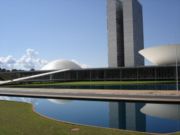
Capital of Brazil
Encyclopedia

Brasília
Brasília is the capital city of Brazil. The name is commonly spelled Brasilia in English. The city and its District are located in the Central-West region of the country, along a plateau known as Planalto Central. It has a population of about 2,557,000 as of the 2008 IBGE estimate, making it the...
. Prior to 1960 the capital was Rio de Janeiro
Rio de Janeiro
Rio de Janeiro , commonly referred to simply as Rio, is the capital city of the State of Rio de Janeiro, the second largest city of Brazil, and the third largest metropolitan area and agglomeration in South America, boasting approximately 6.3 million people within the city proper, making it the 6th...
(1763–1960) and Salvador
Salvador, Bahia
Salvador is the largest city on the northeast coast of Brazil and the capital of the Northeastern Brazilian state of Bahia. Salvador is also known as Brazil's capital of happiness due to its easygoing population and countless popular outdoor parties, including its street carnival. The first...
(1549–1763).
Salvador
Salvador, Bahia
Salvador is the largest city on the northeast coast of Brazil and the capital of the Northeastern Brazilian state of Bahia. Salvador is also known as Brazil's capital of happiness due to its easygoing population and countless popular outdoor parties, including its street carnival. The first...
was established in 1549 by the first Governor-General of Portuguese South America shortly after colonisation began. The city became the seat of the first Catholic
Roman Catholic Church
The Catholic Church, also known as the Roman Catholic Church, is the world's largest Christian church, with over a billion members. Led by the Pope, it defines its mission as spreading the gospel of Jesus Christ, administering the sacraments and exercising charity...
bishopric
Episcopal See
An episcopal see is, in the original sense, the official seat of a bishop. This seat, which is also referred to as the bishop's cathedra, is placed in the bishop's principal church, which is therefore called the bishop's cathedral...
of Brazil in 1552, and is still a center of Brazilian Catholicism.
In the 17th century Rio de Janeiro became a far more practical export port than Salvador so the colonial administration was moved in 1763.In 1808 the Portuguese royal family and most of the aristocracy in the Portuguese capital Lisbon
Lisbon
Lisbon is the capital city and largest city of Portugal with a population of 545,245 within its administrative limits on a land area of . The urban area of Lisbon extends beyond the administrative city limits with a population of 3 million on an area of , making it the 9th most populous urban...
fled Portugal ahead of Napoleon
Napoleon I of France
Napoleon Bonaparte was a French military and political leader during the latter stages of the French Revolution.As Napoleon I, he was Emperor of the French from 1804 to 1815...
's invasion. The Portuguese capital was temporarily transferred from Europe to Rio de Janeiro. The city remained the capital after the independence of Brazil
Brazilian Declaration of Independence
The Brazilian Independence comprised a series of political events occurred in 1821–1823, most of which involved disputes between Brazil and Portugal regarding the call for independence presented by the Brazilian Kingdom...
in 1822 and after the abolition of the monarchy in 1889.
In the 1950s plans were considered for moving the federal capital from the eastern coast to the interior; the interior was sparsely populated and it was hoped that moving the capital to the region would help populate the area. The new capital, Brasília, was inaugurated as the federal capital on 21 April 1960 after being purpose built at great cost.

